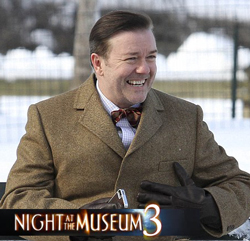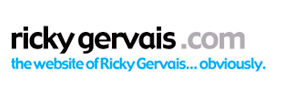Creativity is the ability to PlayI'm loving having a YouTube channel to dick around on. I know I've always dicked around, whether on radio, TV or at the Golden Globes, but with this it's actually expected of me. 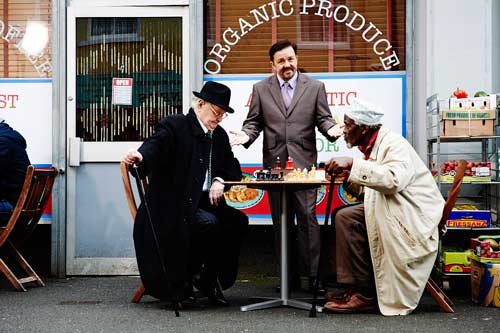
I discovered that this is the best thing about Twitter too. Just playing; mucking about for the hell of it. Although, I could technically count that as work. Dicking about should be tax-deductible for me. Let me explain. Scientific studies of creativity have basically concluded that it can't be taught, as it is a "facility" rather than a learned skill. Putting it very crudely, creativity is the ability to play. And, to be able to turn that facility on and off when necessary. This makes perfect sense to me. Everything I've ever written, created or discovered artistically has come out of playing. 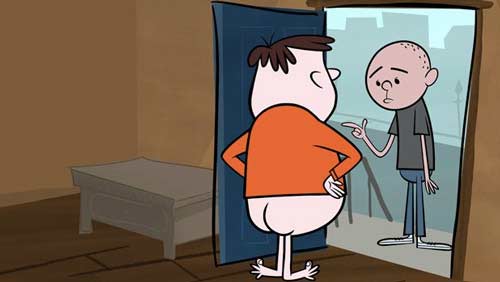
Stephen Nachmanovitch said that, "Creative work is play. It is free speculation using materials of one's chosen form." Basically mucking about with the stuff you have in front of you. Experimenting with it, seeing what happens, and keeping the stuff you like I guess. In fact Scott Adams said, "Creativity is allowing yourself to make mistakes. Art is knowing which ones to keep." 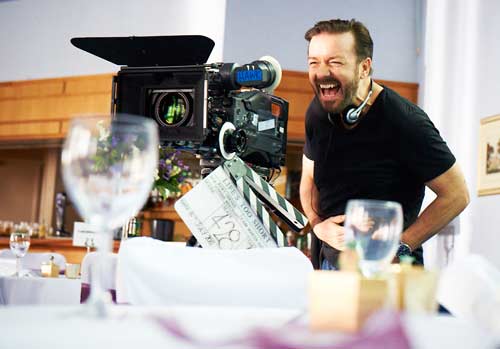
You have to let yourself go to be creative. Children possess this quality but then seem to lose it as they are told, "it's not the done thing". Pablo Picasso summed it up well; "Every child is an artist. The problem is how to remain an artist once he grows up". The answer is simple. Never grow up. I don't mean don't become an adult with responsibility and the weight of the world on your shoulders. I simply mean if you're writing or directing give yourself enough time to play. Play the fool. Goad. Shock. Laugh. Trip over something that isn't there. Try something. And never be afraid to fail. That failure is useful too. It's just another building block. Fame can curb your playful streak in the same way as adulthood, as it is another form of societal pressure. This is dangerous as comedy at some level always has an element of undermining normality. The reason fame can stifle this is because reputation suddenly matters more. Now, it's not just some idiot annoying everyone in the pub, it's that idiot Ricky Gervais. I didn't care about strangers thinking I was an idiot before because they didn't know me. Now, they think they do. But, I've realised something. As important as reputation is in this case, it's still only what strangers think is true about you. Character is who you really are. Only close friends really know you and that's all that counts in the end. It doesn't mean you're not more careful though. Tiny things can get taken out of context and you're often on your guard with this in mind. There seems to be a real us and them battle with artists and critics. An artist moaning about critics is like a fisherman moaning about waves. Tough. They're there. They're there because artists are there. And in some cases vice versa. I think that's because there's limited space for successful creators. It's no lie that some critics have never tried or have failed at the thing they now offer "advice" on, but that doesn't mean that some of them aren't right sometimes. Some great ones are right a lot of the time. And yes there are some great critics. Sure, there are shitty critics. But fuck me there are shitty artists too. There are artists so shitty they couldn't even be critics (that's a joke by the way). You could say, "what's the point in critics?" Good question. I'd like to answer "no point at all" to be honest. But actually I think there is a point to them, and it's this -- they simply add to the debate. Just like chatting with friends, just like this little thing I'm writing now. The point of art is to make a connection. If people talk about it, it's succeeded in a way. People have assumed that, because I don't listen to critics, or take studio notes or whatever, that I think I'm perfect and have never made any mistakes. This could not be further from the truth. Making the mistakes is the point, is the fun, is the important bit. But they have to be my own. The writer Rita Mae Brown said, "Creativity comes from trust. Trust your instincts. And never hope more than you work." The only difficult bit about this is getting final edit. So much creativity is stifled by people who "know better", or by fear of failure, and before you know it, your goals have been twisted and you've forgotten what you set out to do. 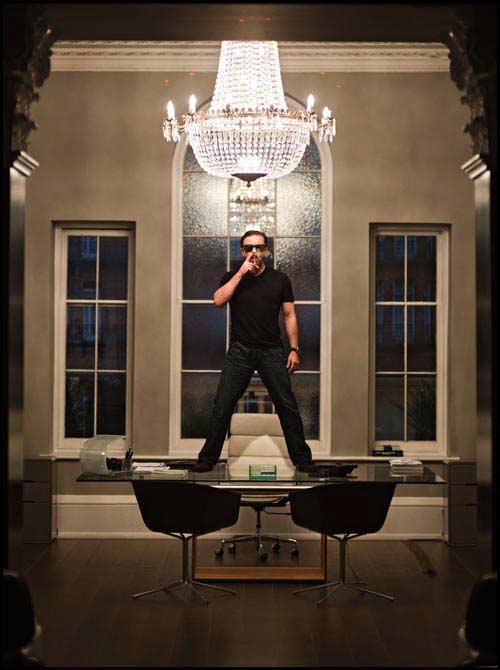
I know many journalists in interviews have considered me combative, defensive and pedantic. They'd be right. But I bet they've never been misquoted. It's infuriating. And I'm careful in interviews because that's the last bit of influence I have on the result. They have the power of the edit. With Twitter I'm much more laid back because my side of the story is out there in black and white too. There's a lovely equality about it. Everyone is famous on Twitter. Everyone has their platform. There are downsides to this and sometimes the internet seems like everyone is just emptying a drawer out of the window, but that's freedom of speech. You can't censor things based on quality. Nor should you. To each his own. I've been critical of this sort of non-regulation in the past and I think I described forums and chat rooms as graffiti. Well maybe Twitter is just another big toilet wall, but there's as much clean space and spray paint as you'll ever need. What are you going to do with it? Create something or destroy someone else's picture? 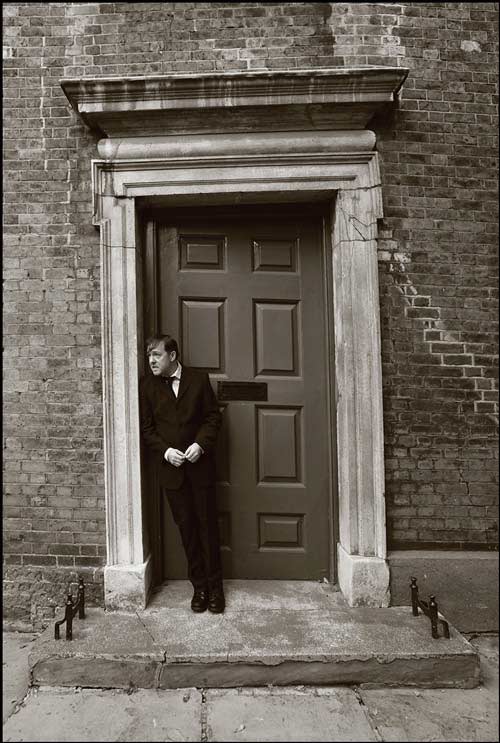
|
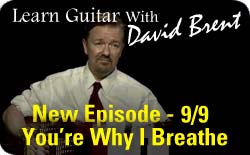
NEWS
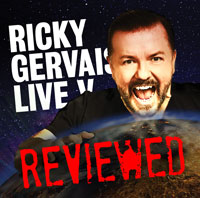


Genius. Fact.
GQ magazine proclaims Ricky to be 'Genius of the Year' at its annual 'Men of the Year Awards'.
Read more here at GQ.com.

Ricky on retweeting idiots
Fitness website Coach talks to Ricky about his career, the Brent movie and routine mischief on Twitter.
Read here.
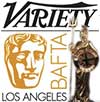
Ricky to receive Charlie Chaplin Award
BAFTA Los Angeles will honour Ricky with the Charlie Chaplin Britannia Award for Excellence in Comedy at its annual celebration in Beverly Hills on October 28.
Read more here.
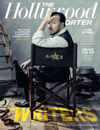
Ricky on the cover
The Hollywood Reporter puts Ricky front and centre on this week's issue.
Read the interview here.

David Brent: Life On The Road Teaser Trailer Released
Ricky's released a first look at the new Brent movie (in cinemas this August).
Check out the trailer on these three sites - along with their insights on this brief glimpse of what's to come.
Watch and read at Shortlist or over at The Guardian, and you can also share your thoughts at Esquire.

Guardian Film Editor on Special Correspondents
The Guardian gives its commentary on the first Special Correspondents trailer. Special Correspondents is exclusive to Netflix from 29 April.
Read and comment here.

Special Correspondents Shortlisted
Shortlist gives a ballsy appraisal of the first trailer for Special Correspondents. Only on Netflix | 29 April.
Read more here.

Trailer Splash: Special Correspondents
IndieWire gives an industry take on the first trailer for Special Correspondents suggesting the movie's potentially a strong awards contender.
Read more here.

Poster Posted: Special Correspondents
Movie resource IMDB has been updated with the poster artwork for Special Correspondents.
Check it out here.


'Special Correspondents' Cast Revealed
Get the low-down on the principal cast for Ricky's new movie along with a group photo for you to match the host of household names and well-known faces.
Read more here.

'Special Correspondents' First Cast Photo
The Wrap has an exclusive look at the cast of Ricky's new movie.
Read more here.

Brent Movie to be released in 2016
'Life On The Road' is set for a summer 2016 release.
Read more here.

Brent Movie gets funding
The lights are green for The Office's David Brent to return in 'Life On The Road'
Read more here.

Netflix buy 'Special Correspondents'
In a characteristically maverick move by Netflix, Ricky's next movie 'Special Correspondents' will make its debut on the game-changing streaming entertainment service.
Read more here.

News Vlog
Hear about Ricky's latest goings on - straight from the man himself.
Watch here on YouTube.

Ricky talks fame, philosophers and following a career in TV.
Details magazine has a Q and A with Ricky
Read here.

9 Questions with Ricky
Backstage chats with Ricky as 'Derek' is nominated for a Golden Globe.
Read here.

Vote For Derek
Wherever you are in the world you can vote for Derek in the National TV Awards
Vote here.

The Improbable Success of Ricky Gervais
A marketeer's perspective on Ricky in the limelight.
Read here.

Ricky on his 21st Emmy Nomination
The Hollywood Reporter quizzes Ricky on his career to date.
Read here.

Ricky's Facebook Q and A
Ricky answers readers' questions via facebook.
Read here on Gervaisaholics.com.
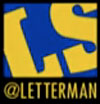





Brent Gets Standing Ovation
A run of sell-out gigs ended at Hammersmith's Apollo on Satuday. Read the reviews...
Daily Telegraph
Radio Times
London Evening Standard
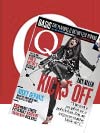
Ricky Talks To Q Magazine
He submits to a probing via Q's regular 'cash for questions' feature which relies on its readers to come up with the questions. And great questions they are too.
Read here.


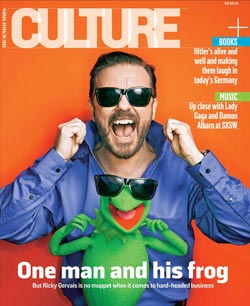
Read the Sunday Times interview.

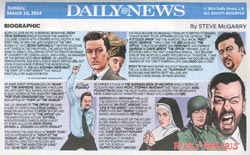
Read the Daily News's one page biography.
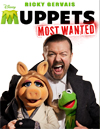

Ricky on Jimmy Kimmel
Ricky chats about his new Muppets movie on ABC's Jimmy Kimmel Live.Watch part 1, part 2 and part 3.

WSJ talks Muppets, Celebs and more
Ricky meets the Wall Street Journal for a chat heralding his new movie, Muppets Most Wanted.
Read here.
